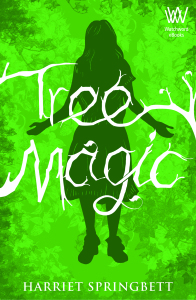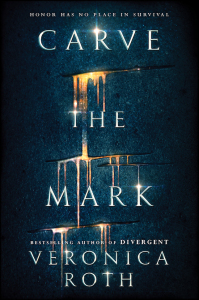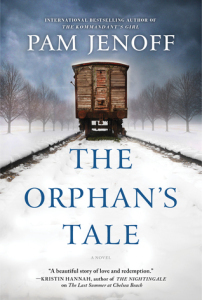Harriet Springbett's Blog, page 12
December 22, 2016
#SundayYA – 22nd Jan 2017
[image error]I’ve been invited as a guest on the Twitter chat show #SundayYA on Sunday 22nd January 2017 at 6pm British time (7pm French time).
Look who else is there in January: the wonderful Emily Barr and Sara Barnard. I’m honoured to be listed below them.
I’ll be tweeting about Tree Magic and trying to answer the host’s questions…
Come along and tweet your own questions, or just read the tweets as they appear live on the #SundayYA thread (click on ‘Latest’ at the top to see a running commentary, or use a tool such as Tweet Deck).
You’ll have a couple of weeks to read Tree Magic before the show as it’s released on 9th January 2017.
Look forward to seeing you there.
Meanwhile, I wish you the very happiest Christmas and a wonderful New Year.


December 19, 2016
Tree Magic review
December 14, 2016
Catless
The thing about cats is that, well… they’re furry, aren’t they? Which is a good and a bad thing.
Good: because there’s nothing like stroking the smooth fur of an arching back for a taste of tactile pleasure. I’m talking about cats’ backs, here. And if they purr while I’m doing it… that’s my day made.
[image error]And bad: because my partner is allergic to fur. So when we got together I had to choose between my cats and the new man in my life. Or dishing up the cats for dinner. Look, they’re all ready!
Several years after I gave my cats away, the fluffy devil came to tempt us again. This time it was the children who pleaded for a kitten of their very own (“promise we’ll take care of it, Mummy”). I explained they would have to choose between a furry pet and their Papa. After suggestions of sleeping in the garage (their Papa, not the desired kitten), they agreed that life was hard and full of difficult decisions to make. And they waited a whole week before asking again.
So, being catless, I found the most obvious solution. No, not borrowing the neighbour’s cat for secret stroking. And not giving up my job to work in a cat shelter. I wrote about them. Subconsciously.
There was a cat in my Novel Zero. There’s a cat in my short story Quark Soup. And there’s a cat – called Acrobat – in Tree Magic. The lovely literary agent who read Tree Magic many years ago said she loved the parts about Acrobat best (but didn’t represent YA authors). I find there’s something about a cat that completes a mental picture of a person or a place.
[image error]When I wrote Tree Magic, there was a special cat in my mind. Here he is, Monty, in the early 1980s with my little sister (sorry about the quality – it was my first ever camera). In Tree Magic, this is what Acrobat does when Rainbow first meets him, which is why she calls him Acrobat (soon shortened to Batty or Bats). Acrobat is actually ginger.
It was only when I entered Curtis Bausse‘s Book a Break competition, however, that cats became the protagonists in a story. In his novel One Green Bottle, Curtis had written that two tabby cats deserted his protagonist. The cats’ story was never told. So, for the competition, Curtis gave us the paragraph and asked us to tell him about the two tabbies. It didn’t need to have any link to One Green Bottle – which was just as well, as I hadn’t read it at that point. (Having now read it, I’d thoroughly recommend this crime story set in France).
Here’s Curtis’s paragraph:
A long time ago, when life was tolerable, almost good, he had two cats that kept him company. How old was he? Seven? Eight? Before his father began to question the worth of his existence. Back then, presumably, he was cute, almost as cute as the tabbies. He never knew what happened to them but they disappeared, both of them, all of a sudden, and he was left only with an inconsolable sadness.
My story, Three Goddesses, is about the way cats make a place feel like home and how they can bring people together. Or not.
Atthys J. Gage, author of Flight of the Wren, Spark and Whisper Blue, judged the competition, after which Curtis spent loads of time compiling his favourite 21 stories into an anthology.
[image error]Like T.S. Eliot’s Old Possum’s Book of Practical Cats (on which the musical Cats was based) the anthology contains cats – and stories – of very different types. From spooky to cultural to historic, there’s something to suit every feline taste. Curtis himself has also contributed, via the cat ‘Smith, Terror of Taunton’, who writes the preface. I’d like to meet Smith. He seems to have a great sense of humour.
So here we are, at the objective of this furry, purry blog post: the illustrated ebook and paperback versions of Cat Tales will be on sale tomorrow, 15th December 2016, here on Amazon. The proceeds go to two charities: Against Malaria Foundation and Cats Protection. There’s also a facebook page where you can leave your comments and follow news of the contributing authors.
Many thanks to Curtis for organising the competition and the anthology. It’s been fun to work with the other writers.


December 2, 2016
What Killed the Radio Star?
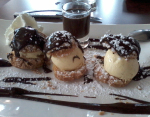 According to the song playing in the restaurant in Angoulême on Friday lunchtime, it was Video. A strange coincidence, I thought, to hear that song today of all days. Radio killed the Tree Magic star, more like.
According to the song playing in the restaurant in Angoulême on Friday lunchtime, it was Video. A strange coincidence, I thought, to hear that song today of all days. Radio killed the Tree Magic star, more like.
Luckily, I had profiteroles to cheer me up.
You know when someone makes a witty remark or asks you a difficult question, and you come up with some brilliant repartee – five minutes too late? Or how you leave an exam and forget everything except the questions you couldn’t answer?
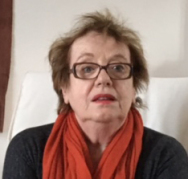 That was exactly how I felt after my first ever radio interview. Helen Millar, the host of RCF Charente’s weekly English programme, AngloFile, had invited me to come and talk about my novel Tree Magic. Here’s a picture of her. She was a lovely host: friendly, reassuring and interesting. And there were no difficult questions. As she’d assured me beforehand, it was just a chat.
That was exactly how I felt after my first ever radio interview. Helen Millar, the host of RCF Charente’s weekly English programme, AngloFile, had invited me to come and talk about my novel Tree Magic. Here’s a picture of her. She was a lovely host: friendly, reassuring and interesting. And there were no difficult questions. As she’d assured me beforehand, it was just a chat.
The thing is, on radio you have to keep talking. And talking is much more difficult than it sounds: talking coherently, in any case. As Barry Gornell recently said at the Cognac European literary festival, writers don’t talk: they listen and watch (though he actually spoke very well). I would include ‘think’ in his list of things writers do. I’d also add that if writers were good speakers, we wouldn’t go to all the bother of writing in order to communicate.
Helen talks admirably, which I guess is just as well for a radio host. But she is also a writer, which completely disproves the point I just made. Damn. I thought it was a good point, too.
Helen is known as Rosemary Mason for her professional writing. As Rosemary, she was a founder writer on East Enders. She has written stage and television plays, was a production assistant at the BBC and a screenwriter in residence for Thamesdown Borough Council. She launched a media writing degree, taught screenwriting and became Head of School at Southampton Solent University.
I should have been interviewing her!
Instead, a friendly technician, Fabrice François, set us up and we galloped through 26 minutes of air time, including me reading from Chapter One of Tree Magic. It passed so quickly that I forgot to thank my publisher (sorry, Impress Books). I forgot to say what Tree Magic is about, and that there is a prologue before the first chapter. I forgot to talk about the legend of Amrita Devi, on which the novel is based. But I did manage to refer to my writing groups and the Charroux and St.Clémentin literary festivals (well, OK: I did forget to say they are bilingual).
Not only is Helen a writer, she also runs an informal writing group near Marthon, to the east of Angoulême. This meant we were able to discuss a whole range of writerly issues, from inspiration to deadlines to short story competitions and writer’s block. We talked about how training as an engineer – which I did – can affect your language skills. And we chatted about the effect of nature on writing.
But each time I began to answer a question, we seemed to bifurcate right and left into fascinating themes such as what happens to hippies and punks when they grow up. Was it just an impression, or did I never actually answer a question she asked? Perhaps that’s just me being engineery…
In any case, it was wonderful to meet another local writer. The RCF (Radio Chrétienne Francophone) studio was a cosy, informal series of offices staffed with smiles. I was even offered a piece of cake. Once the red button stopped glaring at us (well, at me), we continued chatting about writing and Helen told me more about the family history on which she’s currently working. Writing certainly hasn’t killed this radio star.
 You can listen to AngloFile every Tuesday from 6:30-7pm and on Saturdays at 11:30am. My interview was first broadcast on Tuesday 29th November and will be repeated on Saturday 3rd December, as well as on Tuesday and Saturday during the Christmas break.
You can listen to AngloFile every Tuesday from 6:30-7pm and on Saturdays at 11:30am. My interview was first broadcast on Tuesday 29th November and will be repeated on Saturday 3rd December, as well as on Tuesday and Saturday during the Christmas break.
If this post hasn’t put you off, you can even click on the RCF web page here and listen to it now.
And if you’d like to pre-order Tree Magic, you can do so on Amazon and other online bookseller websites. Many thanks!


November 13, 2016
Friday Reads: The Most Anticipated Releases Of 2017
It’s been an exciting year for book releases with Annabel Abbs’s The Joyce Girl, Tracey Warr’s Conquest and James Calum Campbell’s The Seven Trials Of Cameron-Strange but this week we’re taking a look forward to what 2017 has in store…
1. Tree Magic – Harriet Springbett
Kicking off the new year, the YA eBook Tree Magic is due for release in January. 13 year old Rainbow Linnet discovers she can communicate with trees and embarks on a journey of self-discovery, travelling through countries and parallel worlds. Pre-order your copy here.
2. Carve the Mark – Veronica Roth
The popular author of the Divergent series, Veronica Roth is back with a brand new science-fiction series. On an alternative planet every citizen has a unique power. But what happens when your power makes you vulnerable?
3. The Orphan’s Tale – Pam Jenoff
This historical novel tells the story of a woman…
View original post 158 more words


November 10, 2016
When Danube meets Charente
 Last night I met a river. A deep, contemplative river of a person, just like the River Charente as it idles through Cognac.
Last night I met a river. A deep, contemplative river of a person, just like the River Charente as it idles through Cognac.
She is, of course, a writer – and not just any old writer: she’s the 2012 EU Literature prizewinner, Jana Beňová.
Qualifying letters normally tack onto a name, but Jana’s tag, the one which open doors for her, is a prefix. It heralds, in a triumph of trumpets, the Slovakian name that follows; a name few English-language readers would recognise. It introduces her. It stamps value on her work. It instructs us to take her career seriously. And it advises residency hosts that by inviting her to write in their community, they will be rendering a service to Culture (yes, with a capital C).
Cognac’s Littératures Européennes association has taken heed of that advice. During October and November Jana is breathing in the balmy Cognac air and breathing out poetry onto paper. She’s the first guest in the new, annual Jean Monnet residency, which coincides with the literary festival from 17th to 20th November.
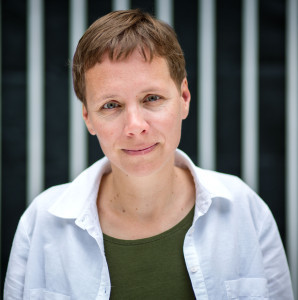
Foto N – Tomáš Benedikovič
Jana is a 42-year-old poet and novelist with a degree in dramaturgy. She was a journalist for a Slovakian daily newspaper for 7 years and has published poetry, short story collections and novels since 1993. Her novel Seeing People Off, subtitled Café Hyena, won the EU prize.
Café Hyène, as it is called in French, is a distinctive work of art. It follows the activities of a group of literary friends in the run-down Petržalka district of Bratislava, the capital of Slovakia. Not only is the language captivating, the storyline is original: it shows the lives of Petržalka citizens in poetic, philosophical bursts, like fireworks.
You won’t have seen this novel in English (why not, for goodness sake?). It will only be available in May 2017, published by indie American publisher Two Dollar Radio. I’d definitely recommend the slim volume: it’s the kind of book you can read several times and still discover something new and thought-provoking each time you open it.
I was lucky enough to be Jana’s interpreter when she arrived in Cognac and addressed the general public. She speaks great English, though little French (just enough to order what she likes to eat and drink). It was my first experience of interpreting and, apart from telling the audience that her favourite activity was working – instead of walking (oops!) – I found it to be an interesting, though intense, challenge.
Jana loves the town of Cognac, which, she says, should be perfect for ageing her work into a VSOP or an XO. When I met her in a wine bar for a chat, she told me how the river brings a sense of raison d’être to a place – much like the Danube in Bratislava. She regularly walks along the River Charente, admiring the golden autumnal light and continuing her writing process in her head. She’s not a writer who sits at a desk and churns out words. She needs time to contemplate things, to let her mind create as she wanders. This is why swimming is one of her favourite activities.
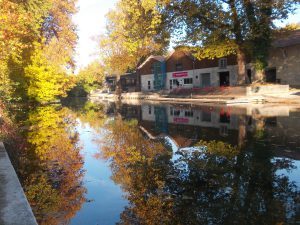 She can’t note the ideas she has while swimming, but is confident that she’ll remember them. When she walks, she always takes notes. I told her how I record my ideas on my telephone when I’m running – even though it can be difficult to hear my recorded words through my puffing. But recording speech doesn’t work for Jana. There’s something in writing that pushes you forward, she says. This doesn’t happen when you speak.
She can’t note the ideas she has while swimming, but is confident that she’ll remember them. When she walks, she always takes notes. I told her how I record my ideas on my telephone when I’m running – even though it can be difficult to hear my recorded words through my puffing. But recording speech doesn’t work for Jana. There’s something in writing that pushes you forward, she says. This doesn’t happen when you speak.
It’s this need to continue being ‘in’ her fiction even when she’s not at her desk that led Jana to stop her work as a journalist: she says you need to be fully present as a journalist, which you can’t do if you’re writing fiction or poetry.
Winning the EU Prize for Literature hasn’t changed Jana’s career path, although it helped financially and has been especially useful in attracting translations. Jana has read books from all over the world, and as a writer she longed to be part of the world literature scene. For a Slovakian writer using a language read by only 5 million people, getting translated is as important as getting published. Of course, EU Literature prizewinner also sounds good!
The prizewinning Café Hyena has a deliberately disjointed style. It isn’t necessarily Jana’s only style – indeed, she didn’t decide to write it in this way. When she starts writing a piece, she’s not fully sure of what it is. She constantly asks herself where it’s going in terms of style, structure and narrator. Then, after some time, it opens and shows her the way. She says the style comes from the body of the piece, so her new work will be different to Café Hyena because she feels she has finished her journey into this style.
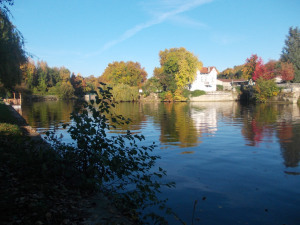 The Jean Monnet residency is the moment for Jana to bring together the ideas for her next oeuvre and set them down on paper. Yes, on paper. She finds the physical act of combining pen and paper important in the writing process, and regrets that screens have replaced typewriters.
The Jean Monnet residency is the moment for Jana to bring together the ideas for her next oeuvre and set them down on paper. Yes, on paper. She finds the physical act of combining pen and paper important in the writing process, and regrets that screens have replaced typewriters.
Residencies are useful because they allow her time to live alone and write; time during which she doesn’t have to do any other work. Writers need to be alone. The best way to be alone without being lonely, according to Jana, is to sit in a café.
Of course, writers need to see people too, and Jana’s schedule includes visits to local towns each week to meet the Charente public. This brings the balance that is key to Jana’s lifestyle – another being the city / country balance. Big cities are great for a short time, but then she needs to come to a country town for the serenity. Even her choice of home is a balance, as she alternates between Spain and Hungary. The building in which Jana writes is important to her too. Luckily, she feels at home in the 200-year-old residency house in Cognac, and likes the sense of other people having lived there.
Writing isn’t just the act of writing, she says: it’s all about living. And when you want to write, you will do anything to combine the two. She owns nothing and has no money saved for retirement – but as long as she’s writing, she is free and open and unafraid.
 Thanks to the Jean Monnet residency, Jana is gathering her Cognac thoughts, ageing them and writing. We will all benefit from what I’m sure will be a complex, mellow XO blend.
Thanks to the Jean Monnet residency, Jana is gathering her Cognac thoughts, ageing them and writing. We will all benefit from what I’m sure will be a complex, mellow XO blend.
Come and meet her at the Salamandre conference centre in Cognac on Saturday 19th and Sunday 20th November at 10am.


November 9, 2016
Tree Magic available to pre-order
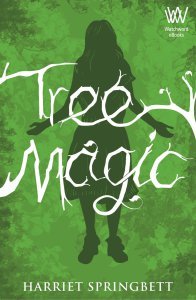 I’m pleased to announce that my YA novel Tree Magic is now available to pre-order from Amazon and other ebook websites. It will be published on 9th January by Impress Books’ digital-first imprint Watchword ebooks.
I’m pleased to announce that my YA novel Tree Magic is now available to pre-order from Amazon and other ebook websites. It will be published on 9th January by Impress Books’ digital-first imprint Watchword ebooks.
“13-year-old Rainbow travels from England to France, through secrets, fears and parallel worlds, to discover whether her ability to communicate with trees is a gift or a curse.
“Will she find her place in today’s scientific society? To find the truth, she must also find herself.”
You have until the end of today, 9th November 2016, to win a Tree Magic prize on Twitter at @ImpressBooks1. Just retweet and follow the pinned tweet at the top of the page to qualify.
Many thanks for your support.


November 1, 2016
Did you say Paradise?
What have a tiny French village and the UK’s most successful literary agent got in common?
No, not a brand of wine. Not a signed author either. The answer is Festilitt, the Parisot bilingual literary festival, in the Tarn-et-Garonne. And, in case you’re wondering, the agent is Andrew Lownie.
The annual Festilitt’s 4th edition, from 21-23 October 2016, was the first for me. I’d heard whispers of ‘Parisot’ among British writers in France for a couple of years, always accompanied by nostalgic sighs, as if the word were ‘Paradise’. So when I had to decide between spending a weekend doing housework, or meeting readers and writers, it wasn’t difficult to choose.
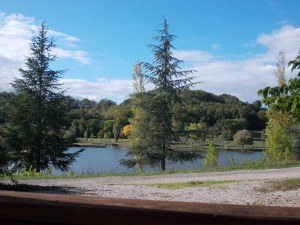
Lac de Parisot
However, it was difficult breaking the news to my bike and tent that the village campsite was closed and that, unlike the Charroux and St.Clémentin lit fests, I would have to leave them behind.
Instead, I opted for a mobile home with a view, and a run around the lake in the misty mornings. Not bad, eh? I almost bypassed the festival in favour of writing on my terrace. After the cows and donkeys in Charroux and the Red Indian in St.Clémentin, the only scary noises were the plopping of acorns onto the roof in the dead of night.
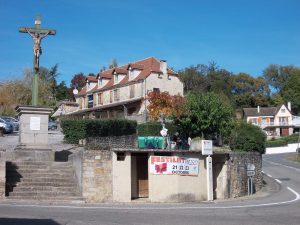 Sunny Parisot was full of people – I think all 500 of them were out in the streets – I mean, street – when I climbed out of my car on Friday afternoon. This buzz of activity convinced me that I must have chosen the right Parisot (there’s another Parisot further south). Strangely, everyone was dressed in dark colours, and I wondered whether I’d missed a dress code page on the Festilitt website. It wasn’t until my exploration took me to the hilltop church that I realised a funeral was taking place. Once everyone was inside, the streets were deserted.
Sunny Parisot was full of people – I think all 500 of them were out in the streets – I mean, street – when I climbed out of my car on Friday afternoon. This buzz of activity convinced me that I must have chosen the right Parisot (there’s another Parisot further south). Strangely, everyone was dressed in dark colours, and I wondered whether I’d missed a dress code page on the Festilitt website. It wasn’t until my exploration took me to the hilltop church that I realised a funeral was taking place. Once everyone was inside, the streets were deserted.
It’s not always easy to arrive, alone, in an unknown place. The friendly welcome I received from the French and British organisers set the tone for the whole event. And the good news was that although I was only on the waiting list for the talk by Andrew Lownie on Finding an Agent, I was encouraged to come in and make myself at home.
His talk was enlightening: given that his agency receives 100 novel submissions a day and only takes on 12 new clients a year, I understood why agent rejections proliferate. Best of all, Andrew, like all the speakers, was present all weekend. His easy smile and generous interest in people’s projects meant that he was easily accessible, giving everyone ample time to ask him their own questions. What a lovely man. What a shame he doesn’t represent YA fiction authors.
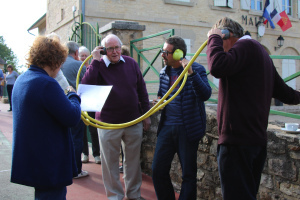
Lektor Studio readings
The official opening was on Friday evening, at aperitif time, of course. I was amazed to see a packed village hall, and even more surprised to see French and British, old and young, mingling and chatting.
Yes, there were official speeches. But there were also copious quantities of buffet food and drink – all prepared by village volunteers and completely free. Members of the Parisot writing group invited me to join them, and I spent a wonderful evening meeting people and forgetting names. Some, like the fascinating Bob Fell – here in the photo listening to a private reading from Lektor Studio – were unforgettable.
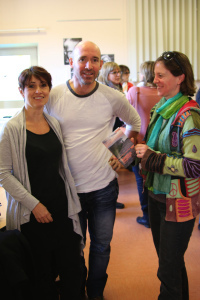
Manu Causse & Emmanuelle Urien
There was also entertainment from talented French authors and translators Emmanuelle Urien and Manu Causse. Their humorous mix of French and English musical poetry – including improvised translations of Beatles hits – ended with a touching song in Occitan. The whole village sang along (at least, all those who speak Occitan).
I understood that the event wasn’t just a literary festival. It was a village celebration. What makes Festilitt so special is the way the French villagers have integrated the British into their lives, and how both nationalities work side by side to bring pleasure to the festival participants.
This intimacy was also obvious the following day, when the audience raised hands to ask questions after each talk, and were acknowledged by their first names. I felt privileged to be part of the group.
The organisation was simple: there was one English and one French session each morning and two of each in the afternoon. Between the afternoon sessions, tea and cakes were provided, and you could eat at the village restaurant at lunchtimes. Although the events and refreshments are free at Festilitt, donations are welcomed through the ‘Friends of Parisot’ scheme.
On the British side was Jim Powell, author of The Breaking of Eggs and Trading Futures. He talked about his work, including the BBC Radio adaptation, and I learnt that after receiving 80 rejections for his first novel and 30 for Eggs, he was considered as one of the 12 best new novelists in 2011. There is hope yet!
A captivating talk about Guy Burgess followed, given by Andrew Lownie (who is the author of Stalin’s Englishman). What a knowledgeable man – have I said that already? Fiona Barton, author of The Widow, talked about the relationship between journalism and fiction. Her insights about crime reporters meeting people at moments of crisis in their lives, and how they must sympathise without showing too much emotion, was thought-provoking.
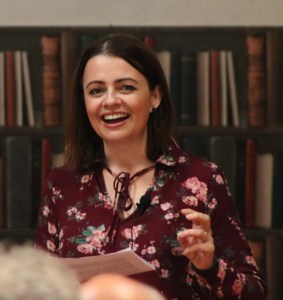
Carys Bray
The lovely Carys Bray, with her natural smile and eyes full of joy, talked about grief and her life as a Mormon, which were both key to writing her prizewinning novel A Song for Issy Bradley. Her excellent readings brought the already excellent novel to life. She was followed by Laura Barnett, who explained her approach to the complexities in writing a novel which tells three versions of a couple’s life: The Versions of Us.
Meanwhile, French authors Hugues de Jubécourt, Luc Corlouër, Frédérique Martin, Georges-Patrick Gleize and Pascal Dessaint gave presentations in the library.
One session was truly bilingual: Susan Elderkin gave a slideshow presentation about her compendium of literary remedies, The Novel Cure, co-written by Ella Berthoud. Susan advocates reading a book to help overcome personal ailments – a therapy known as bibliotherapy. I loved the way the authors present at the festival were asked to seek remedies from Susan in the form of questions about their own literary ailments. When Jim Powell requested a remedy to soothe post-Brexit Britain, along to laughs from the audience, Susan prescribed Malorie Blackman’s Noughts and Crosses to raise political awareness among the young.
As Susan’s French translator couldn’t come, one of the festival’s organising team, Liz Stanley, translated everything into French. I can’t continue without telling you what a remarkable job of organisation, translation and interviewing Liz did during the weekend. Yet she was always accessible to calmly answer any queries. She told me the whole French/British team made this possible, with Kath Humphries and Debra Okitikpi on the British side. And no festival would exist without the founder, Gina Connolly, who has just stepped down from the association.
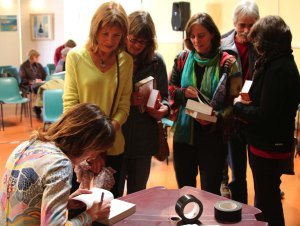
Susan Elderkin signing ‘The Novel Cure’
Because village families hosted the speakers, they were accessible all weekend. So it was as easy to have a cup of tea and chat with international literary figures as it was to talk with villagers and other festival-goers. Equally, the Saturday evening meal, in which 80 people participated, was an ideal occasion to discuss literature, to listen and learn. A speaker or two were placed on each table, and you could choose to sit with a particular one.
If you’ve managed to read right down to here, congratulations! The post is long, because it was such a fantastic event. I could go on for pages in my enthusiasm… But I should get on with the housework I didn’t do last weekend.
Many thanks to the Festilitt organisers, to the speakers, to the fellow writers I managed to catch up with, and to all the extraordinary people I met, ate with, had coffee with, and who bought me much-needed beer (thanks Rob). I look forward to seeing you all next year.
Photos courtesy of Festilitt and Paul Bray


October 11, 2016
YA Booktubing
At the beginning of September I learnt about a special event happening in Cognac. When I read the programme, I immediately cancelled all my appointments. No, Mika wasn’t coming to visit. Nor the Queen. And it wasn’t another street theatre festival.
The event was called ‘Lire l’Europe with the Chippendales’.
Exciting, no?
OK, I admit it was just ‘Lire l’Europe’, or ‘Read Europe’ in English – a literary conference without a Chippendale in sight, organised by the Littératures Européennes team. What excited me was that the afternoon session, entitled ‘From Classics to Booktubing’ would be devoted to discussing Young Adult (YA) fiction.
In case you didn’t know, I have written a YA novel: Tree Magic will be published by Impress Books’ Watchword imprint in January 2017. When I wrote the original story and sent it off to a competition, the judge placed it as a runner-up and suggested I rewrite it for the YA market. Which I did.
Between then and now, I’ve read quite a lot about YA fiction in the English-speaking world. So I was fascinated to find out if the French approach is different. Off I went to Cognac’s auditorium, my notebook under my arm, to meet the European Literature festival organisers and learn about lectures ado.
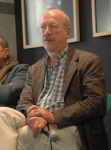
Gérard Meudal
The morning was spent with Gérard Meudal, a French literary journalist who often comes to Cognac to host author events. He also happens to be Salman Rushdie’s French translator. He has a very accessible way of talking about books, and took the audience through a description of all the novels featuring at the European Literature festival (17th-20th November in Cognac – see my blog post). I now have a very long list of books I want to read.
On stage in the afternoon were an author, a publisher and a bookseller. The author was Anne Percin, who writes both YA and adult novels, notably the bestselling series Comment (bien) rater ses Vacances / son Love Story / etc. She also teaches in a secondary school. The publisher, Sylvie Gracia, publishes the DoAdo imprint at Rouergue and also writes for adults. And the bookseller was the dynamic Pauline Fouillet from Ruffec’s ‘Livres et Vous‘. Finally, to keep the ladies in order, Gérard Meudal took the chair.
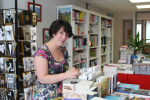
Pauline Fouillet
“What is booktubing?” was the first question addressed. Pauline explained that it’s where you use YouTube to tell your viewers about your favourite books. It’s popular with teenagers. The panel agreed that this obviously worked better as a teen marketing tool than a review in Le Monde.
“What makes a book YA rather than adult?” Anne replied that the way of writing isn’t different at all: she applies the same intensity and the same attention to quality. The protagonist’s age often makes the difference. If he/she’s a teenager, the story is more suited to younger readers. It’s not always clear to her, however, as the theme also plays a role. Anne delves deeper into a theme with adults than with teenagers. With YA fiction, she just scratches the surface.
Sylvie said that she has tried writing for teenagers, without success. She told us an anecdote about a discussion with children’s author Hélène Vignal, in which they came up with the concept of a mental age: some people keep the maturity and imagination of a child or teenager all their lives, which means they lean naturally towards children’s or YA books. This obviously made the audience chuckle.

Anne Percin ©Tina Merendon
Anne pointed out that what’s great with teenage characters is that they are going through a pivotal moment in their lives, through an existential crisis. This is attractive for an author wanting to explore character.
“Do teenagers read books?” According to Pauline, 70% of teenagers read. In her experience, children start to read less in 6ème (Year 7: 11-year olds) and this only starts to pick up again in 3ème (Year 10: 14-year olds). At around 20 years old, the people who read when they were children come back to reading. This is unlikely to happen for those who didn’t read when they were young, or whose parents didn’t read to them. The panel agreed that out-loud readings are very powerful. They give the audience a taste for reading and help sell books.
“At what age do teenagers pass from YA to adult fiction?” At Rouergue, many books are on the border between adult and teen. Sylvie finds that at 15 years old, teenagers will be reading both types of book. Pauline added that what is more important than age is the type of reader: either teenagers are big readers, in which case they will move towards adult books, or they’re occasional readers, and will prefer YA. For Anne, there’s a ‘doudou’ (cuddly toy) effect with YA books. She cited the example of some young men at a reading who bought her latest adult book because they had fond memories of her YA novels.
“How do teenagers choose books?” Pauline told us that when parents come to her bookshop to buy a book for their kids, she advises them to come back with the kids in question. When a parent chooses a book, there is already a barrier to reading it. Pauline added that at external events she always takes a selection of YA books if it’s an adult event, and adult books for YA events. This is because adults are moved by teenage themes. Anne suggested this is also because there is more liberty in the YA themes available during a literary season – adult books tend to have similar themes for each season.
Word of mouth works best with teenagers (including booktubing). Films and TV have a ‘carrot’ effect: teenagers turn to the books afterwards, seeking the extra details that aren’t in the films. Classic advertising by adults has little effect on them. For Anne’s bestselling series, she created a Facebook page for her protagonist – which would be unthinkable for adults, but which worked well for teens. Teenagers are interested in the characters, not the writer.
“What criteria do teenagers apply when looking for a book?” Aha: this was interesting. Pauline said that they often ask for something that’s not too long. Girls like true stories at the moment – vampires and werewolves are old hat. True stories enable them to learn about subjects they feel uncomfortable discussing with their entourage. However, boys buy more books. Sylvie added that thick books and series do have their place, as teenagers also like to plunge into the familiarity of a story world.
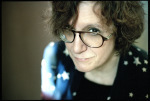
Sylvie Gracia ©Melki
“Are ebook sales higher for teenagers than adults?” Sylvie replied that this medium doesn’t work well with French teenagers, because you need a credit card to buy on the Internet and teenagers don’t have one. What’s more, it’s difficult to tell if an ebook is short or long, and therefore booksellers find it hard to recommend according to the type of reader.
***
I didn’t regret cancelling my appointments to listen to these wise words (even if there were no Chippendales). I now know I have a teenager’s mental age. That explains a lot. The next question is how many shopping trips will it cost me to persuade my kids to booktube about Tree Magic and set up a Facebook page for Rainbow?


September 26, 2016
British Authors in Cognac
You did ask nicely, didn’t you?
In that case, as promised last month, I’ll tell you everything I know about Cognac’s forthcoming literature festival (Littératures Européennes, 17th–20th November 2016). Well, some of what I know. I’ll take questions afterwards.
Littératures Européennes is all about Europe (you know, the family us British are preparing to exit) rather than all about books. The aim is to explore European culture through literature. What I didn’t understand, in previous years, is that preparation actually begins months beforehand with the selection of the contending books.
The festival makes much more sense if you’re aware of the books shortlisted for the prizes, even more so if you take the time to read them. One of the conditions for a book to be selected is that the author must be present at the festival. So before reading a book, you know you’ll be able to meet the person who wrote it. This is particularly interesting for us English speakers – and an oasis in the literary desert for any non-French speakers living in France.
In February, the shortlisted novels for the big ‘Jean Monnet’ prize, chosen by France’s literary intellectuals, are announced. The shortlisted novels for the ‘Prix des Lecteurs’, voted by the region’s libraries, are announced in April. And in May/June, the books shortlisted for the school prizes are announced: the ‘Prix Jean Monnet des Jeunes Européens’ for lycées and the ‘Prix ALE!’ (Adolescents, Lecteurs et Européens!) for secondary schools. Other prizes are privately funded, such as the ‘Prix Bouchon de cultures’ and the ‘Prix Club Soroptimist’.
So, how can we find out what’s been shortlisted? The website is a good start. Even better is to go to the public presentation evening at the beginning of September to hear the festival organisers’ summaries (in French) of their favourite books. Or to go to the professional ‘Lire l’Europe’ event at the end of September (more about this in my next post).
If you can’t make these dates, the next best thing is to read about them – here, for example, bearing in mind that I may be hiding things from you, or exaggerating where it pleases me, or–
OK, OK, I’ll stop waffling and get on with my rough guide to the festival.
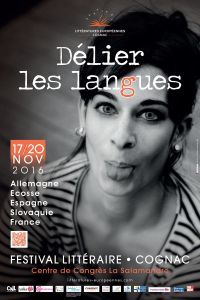 Here’s the poster, with its enigmatic ‘Délier les langues’ title. To save you scrabbling through your dictionaries, this could be translated as ‘Loosening Tongues’. Of course, in French, the word ‘langue’ refers both to language and the tongue…hence the (arresting, in my opinion) photo of the young lady sticking out her tongue. Shame it’s not pierced – that would be even more arresting. It’s a great poster, isn’t it? I like the way it focuses on a person, not on books.
Here’s the poster, with its enigmatic ‘Délier les langues’ title. To save you scrabbling through your dictionaries, this could be translated as ‘Loosening Tongues’. Of course, in French, the word ‘langue’ refers both to language and the tongue…hence the (arresting, in my opinion) photo of the young lady sticking out her tongue. Shame it’s not pierced – that would be even more arresting. It’s a great poster, isn’t it? I like the way it focuses on a person, not on books.
The poster, which was unveiled (or rather, which fell off the wall while the public were taking their seats) on 8th September, refers to the way literature can help understand other languages or cultures; how writing can untie the knots caused by political taboos or childhood secrets; and how writers, particularly eastern Europeans, manage to write in languages other than their own.
You’ll also see the reference to 5 countries on the poster. The festival usually celebrates one country in particular – or one town (last year it was London, as I reported here). This year, marked by the celebrations for Cognac’s 1000th anniversary, the organisers have chosen to honour books from the European countries in which Cognac’s twin towns are situated.
What the poster doesn’t tell you is that the contending books not only come from Germany, Scotland, Spain, France and Slovakia, but that only the young generation of writers were considered. I’m not going to list all the books selected: you can find these on the website. I’ll just mention the ones written by English speakers.
Firstly, Jenni Fagan – named by Granta as one of the best young British novelists – has been shortlisted for the Prix des Lecteurs with her book The Panopticon (in French La Sauvage). Unfortunately Jenni can’t come to the festival.
Secondly, we have Andrew O’Hagan, shortlisted for the Prix Bouchon for his book The Illuminations, alongside Barry Gornell‘s The Healing of Luther Grove. Andrew and Barry should both be at the festival, hopefully going into schools as well as meeting the general public. Andrew O’Hagan, renowned novelist and journalist, has won many awards for his work, including being on the Booker shortlist for Our Fathers. Barry Gornell is a novelist and screenwriter living in Scotland. Click on the links to find out more about them and their work.
A final word for Jana Benova, an English-speaking, Slovakian poet and novelist, who is in residence at Cognac during October and November. Her novel Café Hyène is only available in French at the moment, although it will soon be available in English as Seeing People Off. Winner of the EU Prize for Literature, she’ll be taking part in the festival and will also be present in several Poitou-Charentes towns in October and November. First comes Cognac on 6th October 2016. See the Littératures Européennes website for details.
The full festival programme, which includes round tables, exhibitions, workshops and film projections, will be available in mid-October. In the meantime, visit your local bookshops, such as the Le Texte Libre in Cognac or Livres et Vous in Ruffec, and order your books from the friendly staff there.






